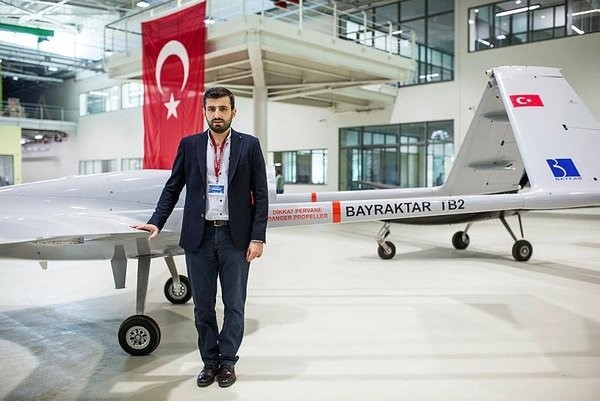Levent Kenez/Stockholm
The owners of Turkey’s Baykar Makina, which produces Bayraktar TB2 military drones, unusually and unexpectedly announced their open support for Ukraine on Friday.
Selçuk Bayraktar, one of the owners of the company and Turkish President Recep Tayyip Erdoğan’s son-in-law tweeted that he condemns in the strongest terms the invasion of Ukraine by Russia, which is disregarding the sovereignty of an independent nation. Selçuk also expressed his support for “Ukraine and Crimea, the homeland of our Turkish brothers resisting the occupation.”
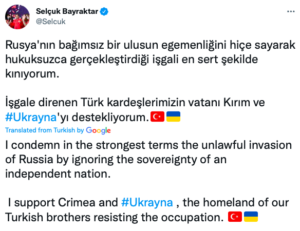
In another tweet two days later, Bayraktar, without mentioning any country by name, attached a letter from Soviet Union leader Nikita Khrushchev to US President John F. Kennedy during the 1962 Cuban Missile Crisis, which brought the two superpowers to the brink of a major war that posed the threat of nuclear weapon use. The letter offered peace, stating that war had caused great suffering throughout history.
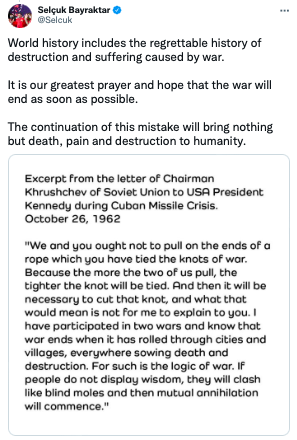
Selçuk also added a note reading: “World history includes the regrettable history of destruction and suffering caused by war. It is our greatest prayer and hope that the war will end as soon as possible. The continuation of this mistake will bring nothing but death, pain and destruction to humanity.”
While pro-government circles welcomed Bayraktar’s messages and largely retweeted them, there were posts on social media that they did not find him sincere because he is a weapons manufacturer. Some social media users also accused him of being a merchant of death.
More strong support for Ukraine came from Selçuk’s brother. Haluk Bayraktar, who was overseeing company projects related to Ukraine, tweeted in Turkish and Ukrainian that he “stands with the honorable people of friendly Ukraine, which has been brutally occupied before the eyes of the entire world.” Haluk also warned that “If not prevented, the war will knock on every door tomorrow,” adding, “The whole world must act before it’s too late to protect innocent civilians.”
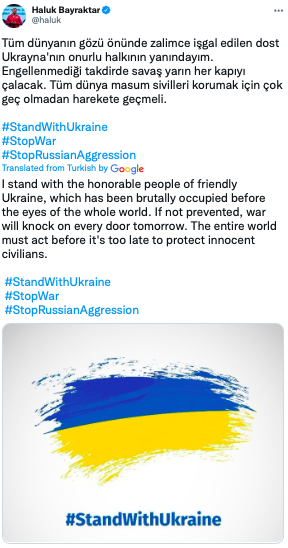
Haluk Bayraktar, who in 2020 was awarded a state medal by Ukrainian President Volodymyr Zelensky for his services to Ukraine and Ukrainian-Turkish relations, was the guest of honor at ceremonies celebrating the 30th anniversary of Ukrainian independence during which Bayraktar’s drones were exhibited in the official parade.
While there was great support for Haluk from the ruling party’s grass roots, many people expressed reservations, as they did for Selçuk, claiming that Haluk’s emotional message was based on commercial interests and that the support Haluk gave to Ukraine was actually for a “customer.”
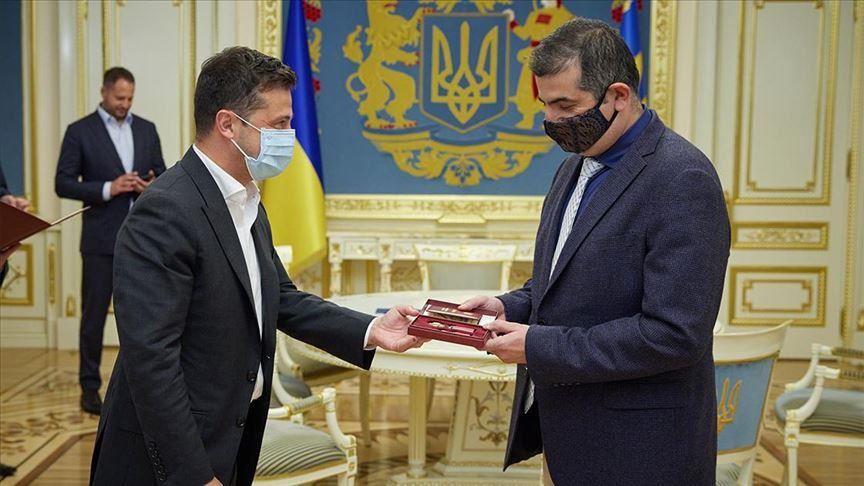
Considering Erdoğan’s cautious stance since the beginning of the Russian invasion, the emergence of the Bayraktar brothers’ messages attracted a significant amount of attention.
Erdoğan had made it his mission to sell Turkish drones during all his foreign trips as well as to present them to visiting counterparts in Ankara. Thanks to Erdoğan, who managed to sell drones to several Middle Eastern and African countries that often experience internal conflict, the company made lucrative profits.
In the 2020 Nagorno-Karabakh war between Armenia and Azerbaijan, Baykar and the face of the company, Selçuk, in particular, garnered great respect from the Turkish public, thanks to the drones, which allegedly contributed to Azerbaijan’s victory.
A Baykar initiative known as Teknofest, which encourages young people to develop an interest in technology and aerospace, is largely supported by the presidency. Erdoğan often refers to the “Teknofest generation” as Turkey’s ideal youth.
It is not known whether Erdoğan was asked about the public support of the Bayraktar brothers for Ukraine, which may put him in a difficult situation with Russian President Vladimir Putin. Baykar is unlikely to be separated from Erdoğan since he has a say in final decisions at the company and Selçuk is a family member.
Erdoğan is caught between trying to prove that Turkey is a staunch NATO member and not angering Putin, with whom he has recently developed close ties. So far, Erdoğan pretends to have a foot in both camps.
Turkey has not yet announce any sanctions against Russia and is the only NATO member that has not closed its airspace to Russia. Moreover, Turkey abstained rather than supporting a motion to freeze Russia’s membership in the Council of Europe last week.
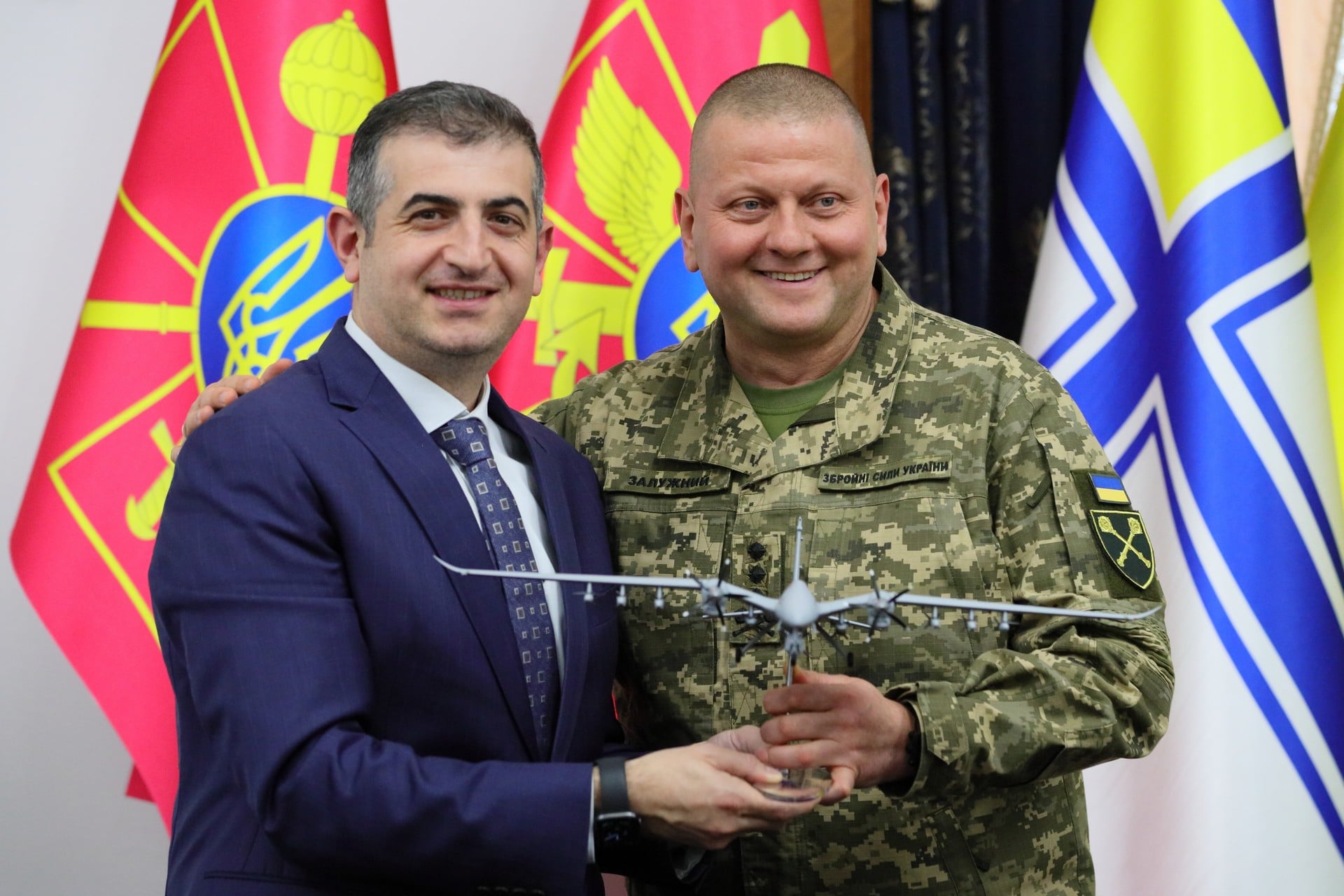
Commander-in-chief of the Ukrainian Army Valeriy Zaluzny (R) and Haluk Bayraktar, CEO of Baykar Makina, which produces the Bayraktar TB2 drones used by the Ukrainian military.
The Ukrainian side officially demanded the closure of the Bosporus and Dardanelles straits to Russian naval vessels. Foreign Minister Mevlüt Çavuşoğlu stated that even if Turkey closes the straits to warships in accordance with the Montreux Convention, the ships of littoral states have the right to transit the waterways back to their bases in the Black Sea.
Following a press briefing after a cabinet meeting, Erdoğan on Monday said his government would use the powers granted by the Montreux Convention over naval traffic in the straits to “prevent an escalation of the crisis,” an ambiguous statement interpreted by many in Turkey as closing the straits. Interestingly, although Erdoğan had previously described the Russian invasion as a “military operation,” he now called the current situation a “crisis.”
Nordic Monitor previously reported that Baykar has been selling military drones to Ukraine since 2019. The trade, which started with six TB2 models Bayraktar UAVs, continued with the delivery of an additional five to the Ukrainian Navy last year. Military experts claim that Turkey has sold more UAVs to Ukraine than announced.
The commander-in-chief of the Ukrainian Army, Valeriy Zaluzny, announced last year that they had 12 TB2s in their inventory. According to news reports published by media outlets close to the Turkish government, Ukraine wants to increase its number of UAVs to 48.
Turkey’s sale of military drones to Ukraine caused tensions with Russia last October. Ukrainian state television broadcast a video showing a Turkish-made military drone used against Russian-backed forces in the eastern Donbas region on October 23, 2021.
The Kremlin said the following day that its fear about Turkey’s decision to sell strike drones to Ukraine was being realized and that the Turkish drones risked destabilizing the situation in eastern Ukraine, while President Zelensky told the press that the use of Turkish strike drones in the conflict in Donbas was defensive and does not violate any agreements.
However, Turkey claims it has no responsibility for how the drones it sells are used. “If a country buys them from us, they are no longer Turkish,” Foreign Minister Çavuşoğlu told reporters after he met with his Russian counterpart, Sergei Lavrov, at the G20 summit in Rome in November 2021.
“Perhaps Turkey has produced it, but it belongs to Ukraine,” he said. Nevertheless, he also called on Ukrainian authorities to stop referencing Turkish drones or Turkey when speaking of the drones.
Answering questions from lawmakers in the parliamentary Planning and Budget Committee on November 4, 2021, Çavuşoğlu said Turkey encounters Russian-made arms in its fight against hostile groups in various places and defended the sale of drones to Ukraine, referring to Russian arms found in the hands of anti-Turkey groups ranging from the Kurdistan Workers’ Party (PKK) to the Libyan National Army (LNA) and Armenian militia in Nagorno-Karabakh.
However, the Russians employed an interesting method to show how serious they are, using Bayraktar Akıncı TİHAs (Attack Unmanned Aerial Vehicles) as the target aircraft in a promotional video of the fifth-generation SU-75 Checkmate fighter jet, which was introduced at the Dubai Air Show on November 16, 2021.
The Russians had taken the Bayraktar drone, which was shot down in Libya, to Russia for examination. According to Russian sources, 15 Bayraktar drones were allegedly shot down by Armenians during the Armenian-Azerbaijani conflict in 2020.
According to a report submitted to the UN Security Council by the Panel of Experts on Libya on March 8, 2021, Bayraktar TB-2 armed drones “were easily destroyed in the air by the Pantsir S-1 air defense system,” which was supplied by the United Arab Emirates and later Russia.
Under a new agreement signed during Erdoğan’s official visit to Kyiv in February 2022, Ukraine would allocate land for the Bayraktar TB2 UAV production facility for 49 years and provide a number of incentives. Parts and materials used in the production of the UAVs will be exempted from customs duties. All financial and personnel information regarding the new facility would be kept confidential.
In addition to the UAV factory, a training center would also be built. Baykar would be exempt from income tax for 10 years due to its investments. The expiration of the agreement is January 1, 2035.
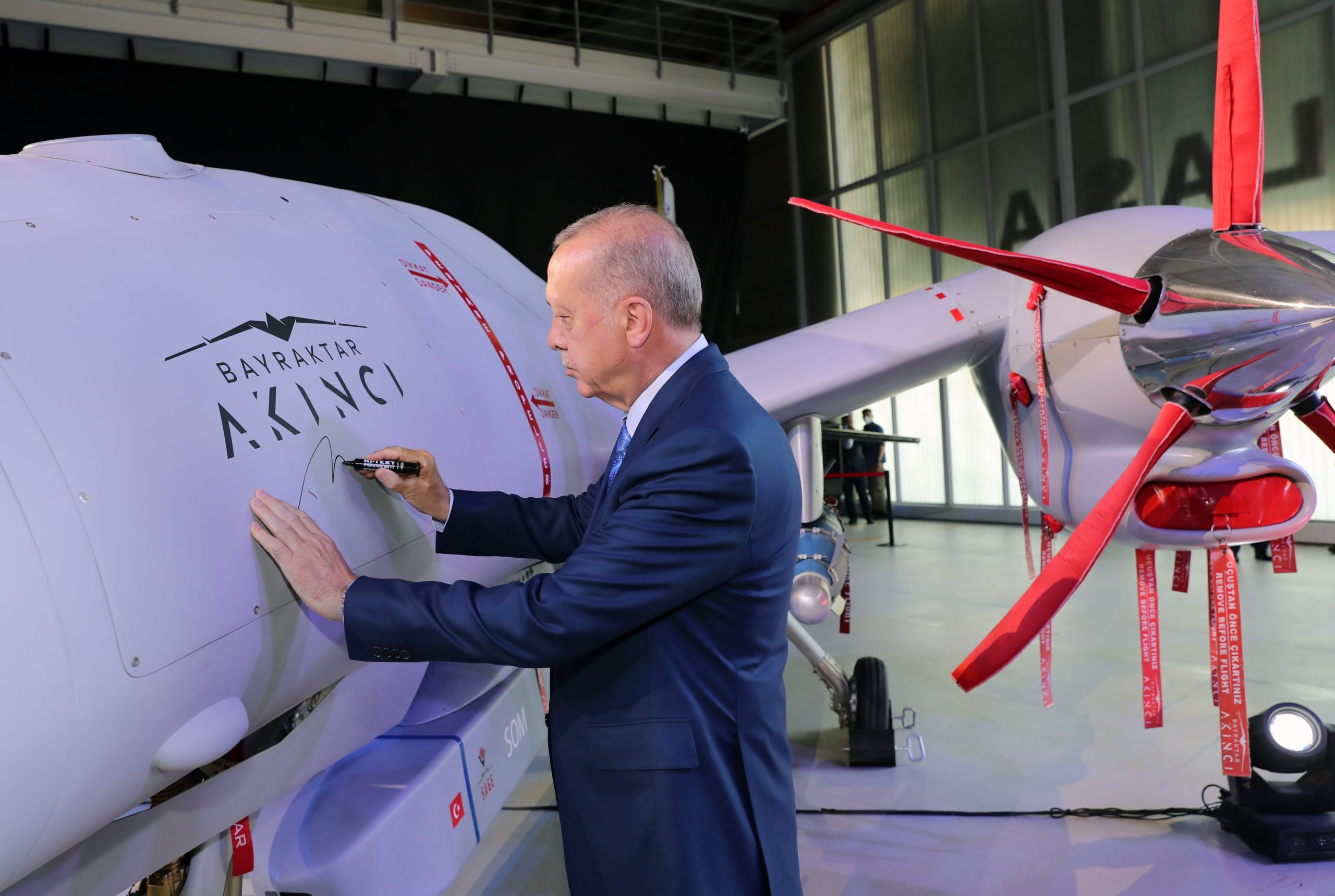
For Baykar, which currently uses engines from Ukrainian companies Ivchenko-Progress and Motor Sich in the military drones they produce, the production facility in Ukraine would also provide convenience in terms of logistics and time.
In January Baykar announced that the company had recently signed the first export contract for the state-of-the-art unmanned combat aerial vehicle (UCAV) Bayraktar Akıncı, one of the company’s newest products. The announcement, which did not reveal the country to which it was sold, emphasized that delivery would take place in 2023. Defense industry experts stated that the sale was made to Ukraine, but due to current tensions between Russia and Ukraine, the name of the country was deliberately not disclosed.
How the agreement will be implemented due to the war conditions is unclear at the moment.
Meanwhile, Russia and Ukraine often mention Bayraktar drones in the war of propaganda. While the Russian army provides news about Bayraktar drones allegedly shot down, Ukrainians broadcast satellite videos of Russian convoys shot down using Bayraktars. So far, there has been no impartial information to prove the claims of the two sides.

